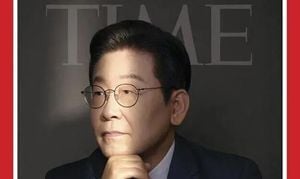On January 19, 2025, TikTok could be facing what some users might see as their worst nightmare—a full-scale ban in the United States. This drastic move is inching closer to reality following the ruling by a federal appeals court which upheld legislation requiring the popular social media app to divest from its Chinese parent company, ByteDance. The court’s ruling came as part of broader national security concerns, and asserts significant insights about free speech rights amid global tensions.
The unanimous decision by the three-judge panel made it clear: "The First Amendment exists to protect free speech in the United States. Here the government acted solely to protect the freedom from a foreign adversary and to limit its ability to gather data on people in the United States.”
Spurred by worries about data privacy and potential manipulation of content, Congress had overwhelmingly passed laws compelling TikTok to part ways with its Chinese connections. After years of speculation and debate surrounding TikTok's ownership issues, this ruling means the app must either be sold or face being locked out from U.S. devices and platforms. Fines could be imposed on app stores and internet service providers hosting the popular app if it fails to comply by the designated date.
Speaking to the media, TikTok expressed its intention to challenge the ruling, hinting at plans to carry the fight to the Supreme Court. Company spokesperson Michael Hughes argued, "The TikTok ban was conceived and pushed through based on inaccurate, flawed, and hypothetical information, resulting in outright censorship of the American people." Citing the potential loss of voices for over 170 million users across the United States and beyond, TikTok is gearing up for what could be its most significant legal showdown yet.
President Biden, who signed the bill compelling the divestiture, has previously emphasized the importance of national security over considerable aspects of business liberties. The ruling is seen as not just about TikTok, but rather part of the U.S.'s broader strategy to confront perceived threats from the Chinese Communist Party, often perceived as manipulative and invasive. A previous statement confirmed, "The Act was the culmination of extensive, bipartisan action by Congress... carefully crafted to deal only with control by a foreign adversary. It is part of contributing measures to counter substantial security risks posing serious concern for Americans’ privacy.”
Both the current and the future political landscapes are interwoven with these judicial decisions, with significant potential for shifts depending on who is at the helm of the White House. Following the appeals court's verdict, Trump has indicated he may rekindle efforts to save TikTok—a stark change from his earlier presidency where he sought to ban it outright. This evolution showcases the fluidity of the political narrative surrounding TikTok, fueled especially by its immense popularity among younger demographics.
Despite the courts ruling out major First Amendment claims raised by TikTok, critics from various organizations—including the Knight First Amendment Institute—worry this decision erodes the boundaries limiting government control over social media platforms. They fear it sets dangerous precedents for media accessibility and flips the core nature of free communication amid growing international tensions.
Meanwhile, ByteDance has made its position clear, saying it is not inclined to sell TikTok. Analysts suggest, should the pressure build, China might shift its stance, possibly utilizing the app as leverage during negotiations with the U.S. The pressure applied by the Biden administration poses unique challenges for the tech giant.
But what does this mean practically? If the app does not meet the divestiture requirement by the deadline or secure significant progress toward future compliance, its U.S. operations may dwindle. While it won't disappear instantly, over time, it would slowly become unusable. Software updates would cease, glitches would mount, and users may find themselves alienated from the once ubiquitous platform. This slow decay could discourage users and investors alike, negatively impacting the brand's image.
With potential consequences looming, how might TikTok navigate this turbulent reality? The immediate future holds discussions of appeal alongside various strategic options as the clock ticks down to the impending January deadline, where both its technical specifications, revenue, and user engagement could hang precariously.
For many, TikTok transcends simple entertainment; it is woven deeply within the social fabric of youth culture across America, serving as both a platform for expression and influence. Amidst all these legal discussions and threats, one must wonder: will this app survive the scrutiny of authorities, or will the slice of everyday social interaction retreat behind bars as they comply to legal exigencies?”



